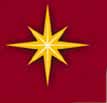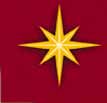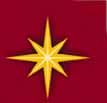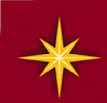|
Christmas 1986
Dear friends
I feel an urge to
write you a Christmas letter this year (rather than letters) - if for no
other reason then in the hope that it may be reciprocated with a
Christmas card next year. The thing is, I've been away for so many years
now in the US that I'm afraid of losing contact with you. Even though
it's been a bit superficial in recent years, you are such a big part of
my past and consciousness that it would be like throwing away a part of
myself if you slipped away completely. My busyness has been a big part
of the reason why things have gone the way they have, and now the
question is how much can be saved by that same busyness forcing me to
write such an impersonal letter. But let me at least tell you a little
about what I've been doing for the past year.
I spend about half the
year touring the US with my images and it's as if my life has taken on a
whole new meaning now after all the years I was practically wrapped in a
duvet with the same thing in Europe. It's incredibly inspiring and
enriching work and I've learned more about racism and oppression in the
dialog with American audiences than in all the years I was a vagabond.
It's especially challenging in these insecure and conservative times,
where students are seeking safe business careers and universities have
increasingly made American Images mandatory to challenge them.
In the fall of 1985,
Vibeke and our son “Flim” (Daniel) moved to Boston to be a little closer
to me. Vibeke took over book distribution from Ann Hodge, who had been
killed shortly before. Every time we settle in the US we romanticize
beforehand and were therefore struck by the harsh realities. It's
impossible to rent if you're a single mother with a child, which Vibeke
was in practice. After a long search, we found a small room (4x4 m) for
only 5000 kr a month. On top of that comes 3000 kr (half day) or 5000 kr
(full day) for kindergarten, car and other fixed expenses, which for us
amounted to 20,000 kr per month. (You appreciate the welfare state when
you try to live without it). The other single mothers Vibeke had to
share a house with had good jobs in research and computer science, but
not a penny to spare for a Coke for lunch or a trip to the movies.
Shortly afterwards, my
father came over to join us on the fall tour. It was a great experience
for both of us. Although 66 years old, he took everything in stride -
sleeping in the poorest ghetto homes and the richest homes. He enjoyed
the many receptions and cocktail parties and the attention that
surrounded him. He helped with the long-distance driving and we had a
good division of labor with him being the errand boy and book seller,
while I ran shows and signed books. We drove in my new upholstered
camper van with double bed, armchairs and table and stereo with Kim
Larsen blaring out over the prairie. I organized the trip so he got a
good cross-section of the USA: New York, Boston, Washington over the
mountains to Kentucky, up to Chicago, Minneapolis, Kansas and out to the
Rockies for a final show for more than 1000 people. He photographed
Denver to show his West Jutland congregation that he had been in the
center of the Dollars - and now he drives around with his own American
Pictures.
I continued out to
California, where I had the biggest show ever with over 2000 in U.C.
Already an hour before, 500 students were lined up. In San Francisco I
saw Tony and Howie, who for 5 years ran shows here in Denmark and now
both have become well-known black leadership figures out there. Both
continue to work with racism and Tony often flies out and follows up my
shows with racism seminars. However, Howie was in jail for the apartheid
blockade of the university the night of my 15th show in Berkeley. In
beautiful Stanford University, I had the first of many mishaps. I was
late, jumped out to ask for directions without braking properly, then my
heavy car took a stroll down the hill and murdered an unlucky VW. There
was no time to leave a note and to protect myself from the police, I
told the crowd that I had smashed a car. The police found me and came to
arrest me as a hit-and-run driver while I was on stage. All night I had
to be photographed and fingerprinted. Almost daily I get stopped by the
police for sleepwalking and the like, but I always get out of it by
giving them a copy of the book. And that's how I got away with it that
night too.
In Los Angeles I met
the second of my misfortunes in the form of one of the groupies
(fanatical fans) who, unlike in Europe, are often a plague in the US and
follow me over long distances. This one, Sandy, had hitchhiked the 2000
km from Denver to Los Angeles in the hope of riding back with me. I
would later bitterly regret not saying no. She was bad luck from the
start. While she was driving the car, one of the tires exploded in a
blizzard in the Utah desert. So freezing cold that I had to stop some
cowboys to help with the tire. Soaking wet, we pulled into a town to get
warm. In my growing annoyance with Sandy, I slammed into a car in the
blizzard at the only traffic light maybe a thousand miles away and
nearly killed three sleeping children. Our front end was completely
smashed and the radiator had to be fixed the next day. We were so late
that we had to drive over 120 mph to get to a show that was organized
“for the public up in the presidents' rich ski resort, Aspen. Several TV
stations were waiting for interviews and lots of advertising money had
been spent, so it could not be organized again. Due to the collision in
the evening, the drive shaft tore loose and knocked the entire bottom
out from under the car, including the automatic transmission. There we
sat in the dark in the middle of the desert, unable to make contact with
the hundreds of people who had driven for hours to see the show. They
waited until 11am - I was later told. It would take a week to get the
car fixed and the next show was 2 days later in Detroit - 2500 km away.
So I had to rent a truck, dropped Sandy off in Denver and made it. But a
few days later in New York, I stayed overnight with the organizer of a
show. Normally, in high-crime metropolitan areas, I spend the night in
the car on top of the equipment, but I couldn't do that in the truck. So
I lay awake all night worried that someone would break in - and indeed
they did: The next morning I found the entire truck empty. I was
completely knocked out. Even though $150,000 worth of equipment was
stolen, the police didn't even bother to write a report. “We only deal
with murder here,” they said. We went around the dumps to at least find
the pictures, but to no avail. Many precious shows had to be canceled in
the coming weeks until I got new equipment flown over from KBH. I felt I
could trace the seeds of each of the accidents back to the first day of
Sandy. This pattern was later confirmed when she came back into the
picture in the spring. Together with Vibeke and Daniel, we flew to Aspen
for a ski vacation so we could get the wagon back. At Christmas her
parents came to Boston and we had a great time after the hardships. We
were terribly busy with book sales, as the book quickly became a
bestseller in the bookstores we personally delivered to. It has since
been passed on to distributors.
In January, the spring
tour started. I had to have new flight cases flown over, which cost as
much as a ticket, so I invited Maya, my Danish “secretary”, over with
them. At the same time, Helge, a brother of Hans Peter Knudsen from my
high school class, came over to drive me around. It's nice to have
Danish friends on the long trips and I hope that more of you will make
use of this free way to see a contrasting side of the USA that tourists
don't normally see: the richest universities and the poorest ghettos,
where I still photograph to update the show. This February, Hans Peter
Knudsen is coming over to join the tour through the Midwest, Texas and
the South.
The spring tour was
extremely stressful with 2 shows per day sometimes or 800 km driving.
Helge helped me publicize the tenth show at Harvard University, where
700 people showed up this time. But then Sandy came into the picture
again. She had traveled to the East Coast to organize shows on her own,
which I couldn't say no to since she was working through my agent. And
they were big shows, so I thought I should give her a chance and took
her in the car to the shows she had organized herself. But immediately
there were all kinds of accidents with the car again. So I forbade her
to continue. By the time I got to one in Washington, she had gone
anyway. In irritation after an evening of arguing with her, I
accidentally stepped so hard on the accelerator that it got stuck and I
smashed the front of the car completely against a lamppost. It only cost
10,000 DKK to get it straightened out, but it was another shock. I was
so stressed at the time that I was afraid for my health. But a few days
later in the Rockies and Los Angeles, good friends took me rock climbing
and it helped. Black students raised money for a driver to take me to
Texas so I could lie in my bed in the back and read for a change. And
then I had a couple weeks to visit many of the poor people you know from
the book in the South. Among other things, I stayed with my ex-wife's
family in Mississippi, had some wonderful days with Mary, whose house
burned down, in her new house in the woods, and was with Linda, the
little girl with the lamp, in Florida. It was great to be with them all
again. Took some new pictures that clearly show the deteriorating
conditions. The rest of the spring was busy in the big universities,
where I performed for a Rockefeller for the fourth time: one of them
interviewed me on TV about his guilt about being rich and suddenly
revealed who he was. Two others became really good friends and talked
about how Fidel Castro had invited them all to stay with him personally,
which had been an immense experience for them. Another person I've had a
lot of fun with is President Carter's daughter Amy, who I stay with
every time I'm in Providence. She always gets me drunk, smokes pot and
is constantly in the papers because she gets arrested in South Africa
and anti-CIA demonstrations.
In May it was time for
a little vacation and Vibeke and Daniel and I drove down to Florida,
stayed with the playboy millionaire from the book (who had been so moved
by the book that he had sold everything and was a hobo for 6 years).
From there we took a plane to the Yucatan in Mexico, where we climbed
the incredible Mayan ruins. Then took a cheap flight to Cuba and stayed
at the old luxurious Hotel National with 17 courses for every meal. Many
of you will remember that Cuba was where I was headed when I went to
America. Now that I finally got there I was more critical, but a
conservative American we lured along was deeply impressed - especially
after seeing the hardship in Mexico. I myself was there to study race
relations, which were beyond expectations. Total integration. The blacks
did not have the high anger level known from black Americans, did not
have higher blood pressure - and did just as well in school as the
whites. I learned a lot about my own racism, which I have since been
able to use in my teaching in the US. Then it was home for a Danish
summer. Previous summers gave me great inspiration when I had the house
filled with foreigners, refugees, Arabs, Africans, singing and music and
atmosphere. But everything went wrong this summer. First Reagan bombed
Libya, then no Americans dared to come. They usually make up the bulk of
my summer audience. One of Annie Hedvard's beautiful tapestries was
suddenly stolen and other things also ruined the otherwise good
atmosphere. But a rich American came over with a pile of money for the
show and helped me weave co-counseling psychology into the show, which
has made it significantly more effective. It's a bit of a stretch to go
into here, but these are the same ideas Tony and Howie work with in
their seminars on oppression - and since I started working with them
myself, it's changed my whole approach to teaching racism. In August, I
used the new principles for the first time. Several of the elite
universities such as Cornell and the conservative Dartmouth use American
Images for all their freshmen. After Cornell, I had two weeks off and
spontaneously went to Jamaica - so quickly that I had $8,000 in cash
with me when I stayed the first night with some pot smugglers in the
Kingston ghetto that everyone had warned me not to go to. I was sleeping
with several other people in a bed in a tin shed when drunken soldiers
ripped us out of bed and up against the wall with machine guns in the
middle of the night.
It was such a horrible
night that I can't account for it here, but Jamaica gave me inspiration
for my work again: why, for example, the Caribbean blacks do so well in
the US compared to the Americans. Jamaica is probably one of the most
beautiful countries I've been to, and when I've studied the psychology
of the other ex-slave countries I have to go back there.
In the US, Helge
Knudsen came over again and we enjoyed some great shows together in the
New England area. Once you get bitten by the touring bug, it's not easy
to stop again. My dad also came back. He seemed to have a hard time
standing some of the women he met on the last tour. In Detroit, I took
him around the ghetto to meet the friends I described in the Easter
letter to my parents printed in the book. Then we went down to show the
Peace March in Baltimore: the 1000 people who had walked the 5000 km
from Los Angeles to demonstrate against nuclear armament. A great
experience to see their mobile city. Then down to the southern states. I
had promised my dad a show in Florida, but just as we got to the palm
trees, a cold wave hit the area. He was shocked to see the shacks and
tin shacks many of my friends in the South live in. And to experience
the grand dinners prepared for our visit to Southern universities at
long polished tables with white professors, crystal glasses, etc. in
palaces with Greek columns - and black waiters to serve us. He enjoyed
sleeping in these lavishly decorated guesthouses while I slept in the
car. The cold in Florida and sleeping in the car in a Boston snowstorm
gave me such a cold that my last TV interview up in Maine took place in
bed and people at a subsequent reception had to parade past my bed.
Yes, it was a very
superficial year: about 90,000 km's of driving, a dozen flights and a
haul of equipment and books. I've completely missed what makes it all
worthwhile: all the incredible, deep and exciting people I've met and
simply fallen in love with during the year. It's the most rewarding part
of the work, meeting and seeing so many beautiful people who work so
seriously with the problems. And to share the grief with them: Marshal's
guilt that his four friends, two priests, a Native American and a
grandmother, each got 17 years in prison for pouring blood over and
smashing a lid on the buried MX missiles while he escaped as their
driver. Or my friend Jim in Kentucky, who is facing 30 years in prison.
Also the more familiar ones that suddenly become close: like when I had
to drive Bishop Tutu and Nelson Mandela's active daughters to an
apartheid demonstration in New Hampshire or the experience of meeting
three of the black writers who had meant the most to me in my wanderings
within an hour when Michael Thelwell unknowingly took me to his friend,
James Baldwin, whom we found drunk as usual in his bedroom. Well it has
been an exciting year.
I am now home until
February and hope there will be an opportunity to see you. If not, you
know I'm always home during the summer months. I hope that I have earned
just one Christmas card for next year. Last year I didn't get a single
one in Danish. But it's also a strangely fragmented life I now lead:
neither here nor there. Therefore, my need to get back to my roots is
perhaps greater than yours. If nothing else, with this letter I would
like to show once again that you are an important anchor for me in my
life, which I don't want to let go of, but - as the impersonality of
this letter also shows - am not very good at holding on to either.
Anyway, I hope you all have a Merry Christmas.
With love and best wishes
Jacob Holdt
Købmagergade 43
1150 Copenhagen K
0l-124412 At Vibeke: 01-133393
Remember to write down
the address in next year's Christmas card list!
|







